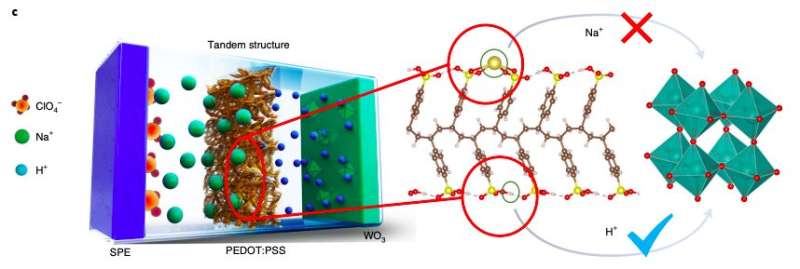February 21, 2022
feature

In recent years, engineers have been developing a wide variety of innovative and promising electronic devices. Among these are electrochromic devices (ECDs), systems that can control optical properties, such as the transmission, absorption, reflection or emittance of light, in reversible ways.
ECDs could have many interesting applications, for instance in the fabrication of smart windows that improve the energy efficiency of buildings, mirrors, and alternative displays for electronic devices. Many electrochromic devices developed in recent years utilize solid-state inorganic or organic materials (e.g., Ta2O5 and ZrO2) as the electrolyte.
Solid-state electrochromic devices have been found to be particularly promising for the creation of smart windows. Nonetheless, these devices have been found to attain limited ion diffusion speeds, which cause them to color and bleach very slowly over time.
Researchers at the Chinese Academy of Sciences have recently developed new electrochromic devices that can rapidly switch color and could thus significantly outperform previously proposed solutions. These devices, presented in a paper published in Nature Electronics, are based on an all-solid-state tandem structure they designed.
“We report fast-switching electrochromic devices that are based on an all-solid-state tandem structure and use protons as the diffusing species,” Zewei Shao and his colleagues wrote in their paper. “We use tungsten trioxide (WO3) as the electrochromic material, and poly (3,4-ethylenedioxythiophene): polystyrene sulfonate (PEDOT:PSS) as the solid-state proton source.”
The researchers evaluated the structure they developed in a series of initial tests and found that it attained very promising results, yet had a low contrast ratio (i.e., a slight difference between its on and off transmittance of light). To overcome this limitation, they introduced a solid polymeric electrolyte layer on top of the PEDOT:PSS layer. This layer effectively provided sodium ions to the PEDOT:PSS and pumped protons into the WO3 layer, via a process known as ion exchange.
“The resulting electrochromic devices exhibit high contrast ratios (more than 90% at 650 nm), fas responses (coloration to 90% in 0.7 s and bleaching to 65% in 0.9 s and 90% in 7.1s), good coloration efficiency (109 cm2 C-1 at 670nm) and excellent cycling stability (less than 10% degradation of contrast ratio after 3000 cycles),” the researchers explained in their paper.
To demonstrate the scalability and potential of the electrochromic devices they developed, Shao and his colleagues used them to create flexible structures with a large area of 30×40 cm2. The fact that they succeeded in creating these structures suggests that their devices could effectively be used to build smart windows of various sizes.
In the future, the electrochromic devices presented by this team of researchers could be introduced and tested in different real-world settings. In addition to utilizing them to create smart windows, engineers could use them to develop new information displays and triple-state optical devices.
Zewei Shao et al, All-solid-state proton-based tandem structures for fast-switching electrochromic devices, Nature Electronics (2022). DOI: 10.1038/s41928-021-00697-4
© 2022 Science X Network
Citation:
New fast-switching electrochromic devices based on an all-solid-state tandem structure (2022, February 21)
retrieved 21 February 2022
from https://techxplore.com/news/2022-02-fast-switching-electrochromic-devices-based-all-solid-state.html
This document is subject to copyright. Apart from any fair dealing for the purpose of private study or research, no
part may be reproduced without the written permission. The content is provided for information purposes only.
Stay connected with us on social media platform for instant update click here to join our Twitter, & Facebook
We are now on Telegram. Click here to join our channel (@TechiUpdate) and stay updated with the latest Technology headlines.
For all the latest Technology News Click Here
For the latest news and updates, follow us on Google News.
